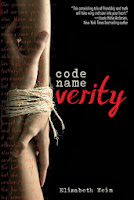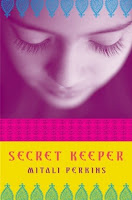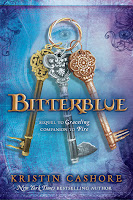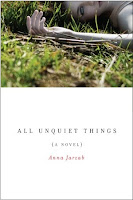Oct. 11th, 1943-A British spy plane crashes in Nazi-occupied France. Its pilot and passenger are best friends. One of the girls has a chance at survival. The other has lost the game before it's barely begun.
When "Verity" is arrested by the Gestapo, she's sure she doesn't stand a chance. As a secret agent captured in enemy territory, she's living a spy's worst nightmare. Her Nazi interrogators give her a simple choice: reveal her mission or face a grisly execution.
As she intricately weaves her confession, Verity uncovers her past, how she became friends with the pilot Maddie, and why she left Maddie in the wrecked fuselage of their plane. On each new scrap of paper, Verity battles for her life, confronting her views on courage, failure and her desperate hope to make it home. But will trading her secrets be enough to save her from the enemy?
From Goodreads
So this was a poor choice for this specific use. It's a PERFECT historical fiction representative, but I can't even begin to write a spoiler-free review at the moment because I'm still processing what just happened. Needless to say, I completely understand why this was one of the hottest books of 2012 & that summary above does the storyline justice. What it doesn't do justice for is Wein's writing. Her intricate writing style is impeccable & perfectly suited for this type of story. That's really all I feel I can say at the moment.
As for its historical fiction portrayal, this book was an exceptional example of what good historical fiction can accomplish. Maggie Stiefvater, a history buff who usually has trouble enjoying historical fiction books, adored this book. Check out her analytic & spoiler-free explanation on Goodreads.
While many people may not enjoy the wartime setting or the prisoner of war type books, Code Name Verity is so much more than that. It transcends pigeon-holing because it's not just about the time period or the events facing the characters; this book represents historical fiction's ability to appeal to all reader demographics because of it's meaning & presence. The story being told, about a true and meaningful friendship, is one that can exist in any time period. The uniqueness of this particular situation is what makes it so perfect for a historical fiction piece.
Not only is this book factual, it's also emotive. The locations & information are well-researched and the nationalities portrayed are quite accurate. What makes it work so well in this historical context is the ability to bring all these characters together & have them interact in their specific manners. I'm sure that's all a bit more muddled than I would prefer, but that's the best way I can think of to explain how unique this particular book is and why it was difficult to use as a historical fiction example.
I'll be cutting down my genreflecting posts to three a month due to my school & work load. I may combine the general & details posts or I may only review one book. My determination to finish this series is strong & I hope you'll bear with me during this transitional period.









